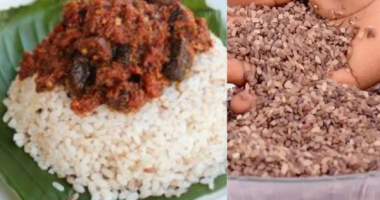8 Foods That Make Your Pee Smell (Other Than Asparagus) – Your daily diet makes a big difference in the way you feel, but it also plays a part when it comes to your body odor.

In fact, the phrase “you are what you eat” is especially accurate when it comes to your pee. Without a doubt, certain foods impact the pungency of your urine more than others. (Hello, asparagus.)
Some foods that make your pee smell are totally healthy. Asparagus, for starters, gives your urine that signature smell because of its high asparagusic acid content. When this compound is broken down during digestion, you’re left with the stinky culprits: sulfur-containing chemicals such as methanethiol and S-methyl thioesters (which, turns out, only some people can smell).
Asparagus isn’t the only food that will give your urine a distinct odor, however. Keep reading for more reasons your pee might have you saying pee-ew!
8 Foods That Make Your Pee Smell (Other Than Asparagus)
1. Brussels sprouts
If you’ve been snacking on Brussels sprouts wings lately, your pee is about to give you away. When your body breaks down the veggie during digestion, it produces methyl mercaptan, a gas that’s well-known for making your urine smell less-than-stellar.
2. Onions
Onions make you cry, and they also make your urine stinky. Like Brussels sprouts, methyl mercaptan occurs naturally in the vegetable. Along with changing your pee, the gas is also responsible for bad breath.
3. Fish
Yep, eating fish could cause your urine to smell fishy, too. According to the University of California, Berkeley, those who have the metabolic disorder trimethylaminuria can’t properly break down the compound trimethylamine. Because of that, the compound builds up and exits the body via sweat, your breath, and urine.
4. Coffee
If you’re an avid coffee drinker, expect a scent. When your body breaks it down, byproducts of coffee called metabolites wind up in your urine. And the result is a coffee-like smell when you go to the bathroom. It also serves as a great reminder that you might want to cut back on the Starbucks a bit.
5. Cumin
Curry is certainly comforting during the winter months, but it might come at a cost. Because cumin—one of its prime ingredients—contains sulfur compounds, it can cause your pee to stink.
6. Garlic
Garlic and onions are in the same family, so it’s no wonder both pungent-smelling veggies also product strong-smelling urine. But there are plenty of benefits that come from dealing with the stench, like its ability to fight inflammation, cancer, and protect your liver.
7. Alcohol
After a night with one too many margaritas, your body’s most important goal is getting all that alcohol out of your system. According to clinical psychologist John Mayer, PhD, it does so through oxidation, a process that breaks down the toxins in alcohol and excretes them through your breath, sweat, and—you guessed it—urine.
8. Pineapple
Phew! Not all foods produce foul-smelling pee. One that actually makes your urine smell good is pineapple. When you eat the high-sugar fruit, sometimes your body fluids start smelling sweet, too.
Other reasons besides food that your pee is smelly
According to urologist Michael Ingber, MD, there are reasons besides what you eat that could tweak your pee’s scent. “Lots of things contribute to the odor of urine. Some may be normal, others may be a sign that something is wrong,” he says. Here, Dr. Ingber highlights the most common non-diet-related reasons for a change in urine smell, including when to see a doctor.
1. Hydration
“Hydration status affects not only the color of urine, but also the odor,” Dr. Ingber says. He explains that when you’re dehydrated, the kidneys concentrate the urine and hold on to excess water. This, he says, changes your pee’s smell along with its color (which you may notices goes from clear or light yellow to a darker hue).
2. Medication
Dr. Ingber also says that certain medications can change the way your pee smells, primarily sulfa drugs, which are used to treat infections as well as diabetes. “These medications can cause urine to have a rotten egg smell,” he says.
3. Rare Genetic Conditions
“Rarely, certain genetic conditions can cause urine odor. For example, maple syrup urine disease is a rare disease that affects the body’s ability to metabolize certain amino acids,” Dr. Ingber says. “If you have this condition—usually diagnosed early in life—your urine may smell like, you guessed it: maple syrup.” (Please speak with a doctor if your urine regularly smells like maple syrup; this condition can lead to organ damage.)
4. Infections
Sometimes, Dr. Ingber says pee changes smell because of an infection, such as E. coli or staph (Staphylococcal). So if you have one of these infections, a change in urine could be a possible side effect.
5. Excess Ketones
Dr. Ingber says having excess ketones can also cause pee to smell differently. “We see this in people who have diabetes when their sugars aren’t well controlled, or when they get into a ‘ketoacidosis’ crisis,” he says. “This is a medical emergency, and requires urgent attention.”
In general, if you aren’t sure what’s causing your pee to smell different than usual, it’s best to see a urologist who can see if it’s related to one of the non-diet causes highlighted above—and help you get the necessary treatment. Dr. Ingber says people who are pregnant or have diabetes or an autoimmune condition are especially encouraged to see a doctor if their pee smell changes and they aren’t sure why. That way, the doctor can run tests to make sure there isn’t an infection or other problem.
“There are some home devices one can use now, which are really cool, and often can help you avoid traveling to a doctor,” he adds. “For example, ScanWell Health has an app which turns your smartphone into our $15,000 urinalysis machine we use in the office. You can pee on a urine test strip, the app will scan it, and tell you the likelihood of it being an infection. If it’s positive, you can connect with a doctor on the app to get antibiotics.”
The bottom line is that what you eat can absolutely change the way your pee smells. If you’ve been loading up on any of the foods highlighted on the list above, chances are you will notice a slight change. But if you have any reason to believe it could be due to a cause other than diet, book some face time with your doc. It could be the yellow flag your body’s waving to grab your attention.
6. Vitamins
Although vitamins play a critical role in maintaining optimal health, you may be surprised to learn that most of them end up in your urine. Vitamins typically fall into two main groups: fat-soluble (easily stored in the body) versus water-soluble (easily washed out of the body). After consuming vitamin-rich foods, you may find that your pee smells stronger than usual and has a darker tinge to it.
Water-soluble vitamins include vitamin C and vitamin B complex (thiamine, riboflavin, niacin, pantothenic acid, pyridoxine, biotin, folate, and cobalamin). Research shows that these water-soluble vitamins quickly dissolve in water upon entering the body and aren’t stored for later use—aka, most of it ends up getting flushed away. Although most changes to your pee due to vitamin intake are harmless, if urine becomes red or extremely dark-colored, seeking medical attention is best advised.
7. Urinary Tract Infection
One of the first symptoms of a urinary tract infection (UTI) is changes in the smell of the urine, followed by pain and discomfort when urinating. As your body fights this bacterial infection in the urethra, urine might become cloudy, brown, or red, with an unusual odor. To keep the infection from worsening, consult your doctor for the best form of treatment. And to learn more about ways to prevent them from occurring, read these four ways to stave off a UTI.
8. Pregnancy
Aside from having the urge to pee constantly, some pregnant women also note changes in the smell of their urine. Most notably, an ammonia-like odor that’s potentially triggered by various hormonal and lifestyle changes. During pregnancy, some women may also experience increased sensitivity to the olfactory system, possibly due to hyperosmia (a heightened sense of smell), making natural changes to urine smell more noticeable. Although most of these changes a normal, if you notice blood in urine, or if it becomes pink, red, or brown, it’s important to contact your doctor. – 8 Foods That Make Your Pee Smell (Other Than Asparagus)






